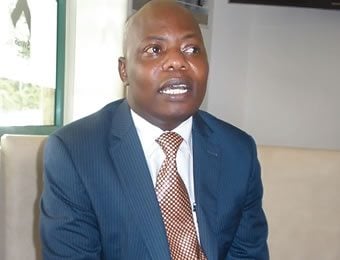The General Manager, Swiss Spirit Hotel and Swiss Alisa Suites, Accra, Ghana, Mr Yusuf Olela, in this interview with WALE OLAPADE, shares his experience in West Africa, ways to improve domestic sourcing of raw materials as well as investing in capacity building among sundry issues.
What is your experience like in the hospitality sector?
I have almost 20 years experience in the hotel industry and my experience has been in Kenya and East Africa; my experience also span years in Zimbabwe, Ethiopia and now in West Africa as a general manager.
This is your first visit to West Africa, how would you assess your experience in Ghana?
The experience has been very fulfilling. The people have been very friendly and it was very easy for me to integrate with people in the community. The cultural diversity is not too different from where I come from in Kenya, so I felt much at home within a very short period of time. When it comes to the industry and what I do, I want to find huge opportunity, huge in the sense that there is so much to be done in the industry; the industry is not as developed as what we have in Kenya, where I come from options are limited, the capacity issues are still there, because the industry is not supported by so much training facilities that will make people deliver the expected services in the industry.
Are you speaking specifically about Ghana or generally in West Africa? I am speaking of Ghana as a whole, but the industry, the capacity is still something which has to be worked on, we need to expand our training institutions and net up the curriculum to fit into what the industry needs. The other challenge apart from capacity is the raw materials that you need in the hotel, which is a problem when you talk of sourcing for them, because a lot of items are imported, which means you cannot get everything entirely fresh. Import means the control of qualities are not in your hands. Import means that things will be relatively expensive and that is why you found out that West Africa as destination and Ghana specifically is relatively more expensive when compared with other countries where similar items are being produced locally.
Is there any hope for Africa becoming producing continent?
I think there is an opportunity for such reality, but I think the market must be sensitised and the ministry and the respective industry like the ministries of Tourism and Agriculture need to map and say what can the country produce which we are importing? When this is done, things will take shape. Also, if today, you started giving people statistics of how many kilogrammes of beef are imported to this country and we decided to set up a ranch and work with different investors, it will happen, but it also depends on the fiscal policy and I think Africa’s economy entirely is still very young and needs to be protected. And when I say protected, it means that you have to ask yourself why? And one of the reasons I think Africa’s economy is not protected is because you found out that imported items still come into Africa and even cheaper than what is being produced here. So this scenario exposed the economy because the buyers will be looking at the best bargain, which will drastically reduce home-grown products. However for this thing to be produced locally there is need for incentive to encourage patronage, including what some people considered to be subsidy. The question remain, why would a product like imported rice imported be cheaper than what is produced here? It means there is something wrong with our production processes, the system and the cost of input in the production chain. So I see a lot of opportunities, especially now that the focus is shifting from oil and gas to the non-oil sectors. This is an opportunity where I see a lot of interest in people participating in different service solution to the industry and one of them is agriculture.
What informs your coming to West Africa?
Actually, what inspired me was the huge opportunities that have not been explored in West Africa as far as the hospitality industry is concerned, because the West African economy has not been driven so much by hospitality, but that is changing. If you look at statistics of the industry that recorded the fastest growth, it is the service industry and hospitality business falls into this group. Secondly, it is to share my experience in an industry that has not been well developed compared to Kenya or East Africa because in East Africa, tourism as an economic segment of the government is considered as one of the leading foreign exchange earners which is not the same when you look at Ghana and Nigeria, but you will find out that with time this is still the area that has a lot of potential. The other time I was checking at the last statistics here in Ghana, tourism in the last few years have not been growing as expected by economy planners, but it is almost bypassing cocoa in terms of foreign exchange, so, basically what happened with cocoa is probably what happened in other African countries where when you produce cocoa and you don’t add value to it goes out as a raw cheap materials and comes back as a finished product more expensive. This is exactly the scenario in the oil industry, we are the major oil producer, but sometimes you are extremely broke.
What led to the transformation of Alisa Hotel to Swiss Spirit?
Alisa started in 1999 with only 14 rooms and later the owner got another space for 25 rooms which is the heritage block and another space, the Landmark for 68 rooms then the Pegasus building with 100 rooms and also harnessed resource to put up another 99 rooms he christened the Village which made a total of 267 rooms. This is really hard work for a company that is proudly owned by a Ghanaian and was built from scratch to its present stage. When I came to the hotel, my first task was to concentrate on why I actually came to Alisa Hotel, which was basically to evaluate the facilities and services we are offering here and to compare with what the market has and the clienteles that come from different international communities, within and outside Africa. I realised that we needed to reposition ourselves for service delivery and product, we started working on this and we developed the standard and procedures, we looked at the structures to make sure that they align with what we want to achieve, we launched a preparatory procedure, we assisted the managers to set objectives and all the basics that it takes to run an organisation successfully. Then I asked myself what next after all these? And what came to my mind is sustainability, how do we keep our services and standards the way they are supposeed to be as long as we run this institution and that was where the idea of an international chain came in. The reason we brought in the international chain is to help us match our services with international standards because there is a quality assurance compliance expectations we must achieve, then it develop the people in terms of training needs and exchanges that take place, which actually integrate us with the global e-commerce platform that makes sure that our products and services can easily be accessed by someone who have not visited Ghana. So with the international chain, the brand equity come in which makes people to easily associate with the business that will give them a similar brand in Ghana. That connectivity was missing and that was why the management decided that it will give the hotel a leverage and long term goal of sustainability to get into a partnership with an international chain. We began the search and met with different international brands before we finally considered Swiss international.
WATCH TOP VIDEOS FROM NIGERIAN TRIBUNE TV
- Relationship Hangout: Public vs Private Proposals – Which Truly Wins in Love?
- “No” Is a Complete Sentence: Why You Should Stop Feeling Guilty
- Relationship Hangout: Friendship Talk 2025 – How to Be a Good Friend & Big Questions on Friendship
- Police Overpower Armed Robbers in Ibadan After Fierce Struggle






